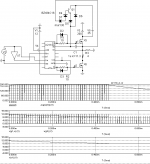darkfenriz said:Kanwar
Why not just add a voltage source to a source of upper mosfet i.e. parallel to normal bootstrap cap?
You mean to say completely isolated floating 15V referenced to source, it could be done very easily, but the floating supply then would become a stable source of great EMI radiation inferno!!!
I was once thinking of the watchdog thingie as well but I like the approach of constantly powering the high-side driver better.
Regards
Charles
Regards
Charles
Indeed 2.2u will almost enough to heavy clipping on the very low frequency, though ir2110's typical -UVP treshold is 8.3V@75C (9.5V worst case), and Vbs static idle current 350uA (worst case), hence 12V[Vdd, no more if fastest switching is needed]-.6V[diode's drop]-50mV[to single charge 100-200nC old hat MOSFET]-9.5V=1.85V; 2.2uF*1.85V/350uA=11.6mS i.e. 43hz 100% clipping ok, so would be the best choice >4.7uF yet.
You cannot decouple this w.r.t. ground, you have to use a common mode choke to decouple the floating voltage source....darkfenriz said:Why, even decoupled?
phase_accurate said:I was once thinking of the watchdog thingie as well but I like the approach of constantly powering the high-side driver better.
Regards
Charles
Thanks for the vote of confidence!Sir
The watchdog, The chargepump, The fully isolated floating supply each one is having there own merits and demerits, but my elevated high side bootstraping technique is most simple to do and easy to achieve with the required results so far.....
Regards,
Kanwar
Workhorse said:
but my elevated high side bootstraping technique is most simple to do and easy to achieve with the required results so far.....
Really? you think so? Maybe in DC convertors with const duty cycle =1 your technique adaptable, but in audio range amp it has more disadvanatage, than benefits...imho 😉
I suppose the case, that transform your amp to smoke generator differ from version with hi side driver problem.
Really? you think so? Maybe in DC convertors with const duty cycle =1 your technique adaptable, but in audio range amp it has more disadvanatage, than benefits...imho
I don't know how you come to this conclusion since it should be vice versa IMO.
Regards
Charles
IMO D6 might not be necessary but D5 will protect the transistor from reversing on transients.
Regards
Charles
Regards
Charles
I think that the pass transistor is going to have a really hard time handling the high dV/dt switching transients without conducting more current than what it is expected to. Also, the bias resistor has to provide enough current to bias the zener and the pass transistor with only 10V across but it also has to be able to whitstand the full 200V supply across it too, which seems like a big compromise...
I think that the pass transistor is going to have a really hard time handling the high dV/dt switching transients without conducting more current than what it is expected to.
That's why I would prefer a current source that is supplying this 350 uA.
Regards
Charles
No, no, no and no again ! You would only have to supply the quiescent current of the driver. The pulse is still supplied by a small bootstrap cap as usual. The thingie is just there to prevent undervoltage lockout for any arbitrary clipping situation.
Regards
Charles
Regards
Charles
Does anybody know a current source capable of whitstanding 5V/ns slopes whithout too much miller effect?


phase_accurate said:No, no, no and no again ! You would only have to supply the quiescent current of the driver. The pulse is still supplied by a small bootstrap cap as usual. The thingie is just there to prevent undervoltage lockout for any arbitrary clipping situation.
Regards
Charles
The pulse is still supplied by a small bootstrap cap +DIODE as usual?
Why not use standard bootstrap and the circuit of WorkHorse only when output are near voltage rail? More efficient and less dissipative! Or like I use in some serie of amplifier, a bootstrap circuit with a 555 charge pump just to witsthand clipping condition...More efficient! 4 watts of lose is too much in a class d amplifier. The trick is only to find a way to hold voltage of hight side at clipping...
Fredos
Fredos
- Status
- Not open for further replies.
- Home
- Amplifiers
- Class D
- Active Elevated Rail Hi side Bootstrapping Technique for IR2110


